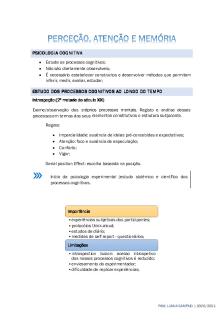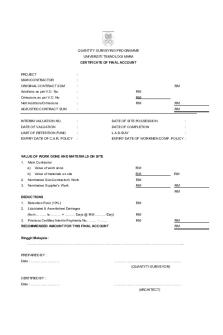PAM workload duties of educators PDF

| Title | PAM workload duties of educators |
|---|---|
| Author | Lené Coetzee |
| Course | Onderwysreg |
| Institution | North-West University |
| Pages | 3 |
| File Size | 64 KB |
| File Type | |
| Total Downloads | 32 |
| Total Views | 125 |
Summary
Summaries ...
Description
PERSONNEL ADMINISTRATION MEASURES
3. WORKLOAD OF EDUCATORS (SCHOOL BASED) 3.2 Workload per educator (a) All educators should be at school during the formal school day, which should not be less than 7 hours per day, except for special reasons and with the prior permission of the Principal. The Principal will exercise his/her discretion in this regard based on provincial policy. The 7 hours per day includes the breaks and the period/s in which the learners are not at school. .... 4. DUTIES AND RESPONSIBILITIES OF EDUCATORS 4.5 Teacher (a) JOB TITLE: Educator - public school (b) RANK: TEACHER (c) POST LEVEL: 1 (d) THE AIM OF THE JOB: To engage in class teaching, including the academic, administrative, educational and disciplinary aspects and to organise extra and cocurricular activities so as to ensure that the education of the learners is promoted in a proper manner.· (e) CORE DUTIES AND RESPONSIBILITIES OF THE JOB: The duties and responsibilities of the job are individual and varied, depending on the approaches and needs of the particular school, and include, but are not limited to, the following: (i) Teaching • To engage in class teaching which will foster a purposeful progression in learning and which is consistent with the learning areas and programmes of subjects and grades as determined. • To be a class teacher. • To prepare lessons taking into account orientation, regional courses, new approaches, techniques, evaluation, aids, etc. in their field. • To take on a leadership role in respect of the subject, learning area or phase, if required. • To plan, co-ordinate, control, administer, evaluate and report on learners' academic progress.
(ii) Extra- & co-curricular • To be in charge of a subject, learning area or phase.
• To jointly develop the policy for that department. • To co-ordinate evaluation/assessment, homework, written assignments, etc. of all the subjects in that department. • To provide and co-ordinate guidance: - on the latest ideas on approaches to the subject, method, techniques, evaluation, aids, etc. in their field, and effectively conveying these to the staff members concerned - on syllabuses, schemes of work, homework, practical work, remedial work, etc. - to inexperienced staff members - on the educational welfare of learners in the department. • To control: - the work of educators and learners in the department - reports submitted to the Principal as required - mark sheets - test and examination papers as well as memoranda - the administrative responsibilities of staff members • To share in the responsibilities of organising and conducting extra and co-curricular activities. iii) Personnel • To advise the Principal regarding the division of work among the staff in that department. • To participate in agreed school/educator appraisal processes in order to regularly review their professional practice with the aim of improving teaching, learning and management. iv) General/administrative • To assist with the planning and management of: - school stock, text books and equipment for the department - the budget for the department and - subject work schemes • To perform or assist with one or more non-teaching administrative duties, such as: - secretary to general staff meeting and! or others - fire drill and first aid - timetabling - collection of fees and other monies - staff welfare - accidents • To act on behalf of the Principal during her/his absence from school if the school does not qualify for a Deputy Principal or in the event both of them are absent. (v) Communication • To co-operate with colleagues in order to maintain a good teaching standard and progress among the learners and to foster administrative efficiency within the department and the school. • To collaborate with educators of other schools in developing the department and conducting extracurricular activities. • To recognise that learning is an active process and be prepared to use a variety of strategies to meet the outcomes of the curriculum.
• To establish a classroom environment which stimulates positive learning and actively engages learners in the learning process. • To consider and utilise the learners' own experiences as a fundamental and valuable resource. (ii) Extra- & co-curricular • To assist the HOD to identify aspects which require special attention and to assist in addressing them. • To cater for the educational and general welfare of all learners in his/her care. • To assist the Principal in overseeing learner counselling and guidance, careers, discipline and the general welfare of all learners. • To share in the responsibilities of organising and conducting extra. iii) Administrative • To co-ordinate and control all the academic activities of each subject taught. • To control and co-ordinate stock and equipment which is used and required. • To perform or assist with one or more of other non-teaching administrative duties such as: - secretary to general staff meeting and! or others - fire drill and first aid - time-tabling - collection of fees and other monies - staff welfare - accidents iv) Interaction with stake-holders • To participate in agreed school/educator appraisal processes in order to regularly review their professional practice with the aim of improving teaching, learning and management. • To contribute to the professional development of colleagues by sharing knowledge, ideas and resources. • To remain informed of current developments in educational thinking and curriculum development. • To participate in the school's governing body if elected to do so. (v) Communication • To co-operate with colleagues of all grades in order to maintain a good teaching standard and progress among learners and to foster administrative efficiency within the school. • To collaborate with educators of other schools in organising and conducting extra and co-curricular activities. • To meet parents and discuss with them the conduct and progress of their children. • To participate in departmental committees, seminars and courses in order to contribute to and/or update one's professional views/ standards. • To maintain contact with sporting, social, cultural and community organisations. • To have contacts with the public on behalf of the principal....
Similar Free PDFs

PAM workload duties of educators
- 3 Pages

PAM Resumo
- 53 Pages

Established Duties of Care
- 15 Pages

Nature of Fidiciary Duties
- 11 Pages

Workload Planning and Staffing
- 6 Pages

Tecnica PAM
- 5 Pages

Rights and Duties of Agent
- 5 Pages

Duties of Directors - Exam Notes
- 3 Pages

PAM T1 Percepción - Apuntes 1
- 3 Pages

Final Acc Form - PAM
- 1 Pages

PAM Modulação E Multiplexação
- 15 Pages

PAM S09 Tareas Asincronas
- 4 Pages

Directors duties
- 4 Pages
Popular Institutions
- Tinajero National High School - Annex
- Politeknik Caltex Riau
- Yokohama City University
- SGT University
- University of Al-Qadisiyah
- Divine Word College of Vigan
- Techniek College Rotterdam
- Universidade de Santiago
- Universiti Teknologi MARA Cawangan Johor Kampus Pasir Gudang
- Poltekkes Kemenkes Yogyakarta
- Baguio City National High School
- Colegio san marcos
- preparatoria uno
- Centro de Bachillerato Tecnológico Industrial y de Servicios No. 107
- Dalian Maritime University
- Quang Trung Secondary School
- Colegio Tecnológico en Informática
- Corporación Regional de Educación Superior
- Grupo CEDVA
- Dar Al Uloom University
- Centro de Estudios Preuniversitarios de la Universidad Nacional de Ingeniería
- 上智大学
- Aakash International School, Nuna Majara
- San Felipe Neri Catholic School
- Kang Chiao International School - New Taipei City
- Misamis Occidental National High School
- Institución Educativa Escuela Normal Juan Ladrilleros
- Kolehiyo ng Pantukan
- Batanes State College
- Instituto Continental
- Sekolah Menengah Kejuruan Kesehatan Kaltara (Tarakan)
- Colegio de La Inmaculada Concepcion - Cebu


